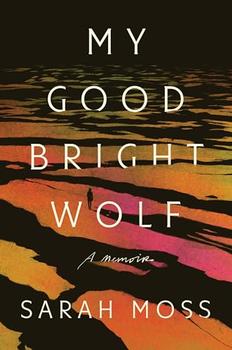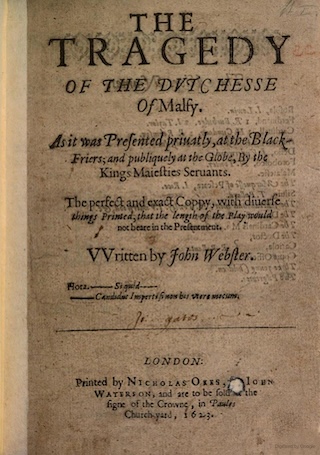Summary | Excerpt | Reviews | Beyond the Book | Read-Alikes | Genres & Themes | Author Bio

A Memoir
by Sarah MossThis article relates to My Good Bright Wolf
In her memoir My Good Bright Wolf, Sarah Moss conjures up an imaginary wolf spirit to support her childhood self. She claims the idea came from a line in one of the first poems she memorized, "A Dirge" by English dramatist John Webster, widely regarded as the last of the great Elizabethan playwrights, second only to William Shakespeare.
Not much is known about Webster. He was born sometime around 1580 in London. Scholars believe he was probably a coach maker, as that was his father's profession. Additionally, his father was a well-regarded member of the Guild of Merchant Taylors (a London-based livery company that at the time was a trade guild), making it likely that Webster attended the Merchant Taylors' School. It's thought he may have also studied law, as there's an entry under his name in the admissions register of the Middle Temple (one of four Inns of Court entitled to call their members barristers) in 1598, and some of his plays make it clear Webster had some knowledge of law and politics. In 1606 he married Sara Peniall by special license (she was seven months pregnant with their first child at the time).
Most of Webster's plays were collaborations with other playwrights, but he's best known for two gruesome tragedies of his own based on real-life events that occurred in Italy. The first, The White Devil (published in 1612 as The White Divel; or The Tragedy of Paulo Giordano Ursini, Duke of Bracciano), was a fictionalized account of the murder of Corombona 30 years prior. Although it contained plenty of sex and violence, it wasn't a hit. There have been a few attempts to revive it over the past century or so, but the play has never been filmed or televised.
 The second work, The Duchess of Malfi (c. 1618), was much more successful (fellow playwright Thomas Middleton called it a "masterpiece of tragedy"). The Royal Shakespeare Company provides the following synopsis: "In an attempt to prevent the fiercely independent Duchess from marrying the man she loves, her corrupt brothers go on a disturbing quest to destroy her … Remarkable for its inventive and grotesque violence, yet full of dark humour, this violent revenge tragedy asks how anyone can survive in a world where masculinity has become toxic." The play is based loosely on the life of Giovanna d'Aragona, Duchess of Malfi. Unlike The White Devil, The Duchess of Malfi has remained part of the theatrical canon.
The second work, The Duchess of Malfi (c. 1618), was much more successful (fellow playwright Thomas Middleton called it a "masterpiece of tragedy"). The Royal Shakespeare Company provides the following synopsis: "In an attempt to prevent the fiercely independent Duchess from marrying the man she loves, her corrupt brothers go on a disturbing quest to destroy her … Remarkable for its inventive and grotesque violence, yet full of dark humour, this violent revenge tragedy asks how anyone can survive in a world where masculinity has become toxic." The play is based loosely on the life of Giovanna d'Aragona, Duchess of Malfi. Unlike The White Devil, The Duchess of Malfi has remained part of the theatrical canon.
"A Dirge" is from the earlier play:
Call for the robin redbreast, and the wren,
Since o'er shady groves they hover,
And with leaves and flowers do cover
The friendless bodies of unburied men.
Call unto his funeral dole
The ant, the field-mouse, and the mole,
To rear him hillocks that shall keep him warm,
And (when gay tombs are robb'd) sustain no harm;
But keep the wolf far thence, that's foe to men,
For with his nails he'll dig them up again.
(Hear it read here.) The bolded text are the two lines that Moss cites in her book.
Interestingly, T.S. Eliot references Webster in his revolutionary work The Waste Land, subtly changing the lines' meaning with just a couple of tweaks:
Oh keep the Dog far hence, that's friend to men,
Or with his nails he'll dig it up again! (Lines 74-75)
It's not known where, how, or when Webster died, but it's thought his death occurred around 1634. Webster lives on in popular culture, though; in the 1998 film Shakespeare in Love, he makes two cameo appearances. In the first he enjoys feeding live mice to cats, and when questioned on his opinion about the Shakespeare play Titus Andronicus he replies, "I like it when they cut their heads off. And the daughter mutilated with knives … Plenty of blood." Later, he says of Romeo and Juliet that he "liked it when she stabbed herself."
Webster's work has been re-evaluated in recent decades, with his plays receiving more acclaim for their characters' psychological depth. The Duchess of Malfi, in particular, is seeing a revival; a production opened in London's Trafalgar Theatre in October 2024, directed by Zinnie Harris and starring Jodie Whittaker (you can see the trailer here).
Title page from the first edition of The Duchess of Malfi (1623), courtesy of Royal Shakespeare Company
Filed under Books and Authors
![]() This article relates to My Good Bright Wolf.
It first ran in the November 6, 2024
issue of BookBrowse Recommends.
This article relates to My Good Bright Wolf.
It first ran in the November 6, 2024
issue of BookBrowse Recommends.
Your guide toexceptional books
BookBrowse seeks out and recommends the best in contemporary fiction and nonfiction—books that not only engage and entertain but also deepen our understanding of ourselves and the world around us.